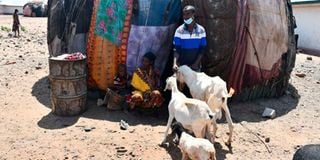Premium
‘We scramble for food with children’

Golicha Hassan with the goats he failed to sell at the livestock market in Marsabit County. Residents have expressed fear of starvation.
What you need to know:
- Camel deaths are an indication of the gravity of the problem, as that only happens in extreme drought.
- More than 200 households in Kambi Nyoka have despaired as most of their animals have also died.
The scorching sun is diminishing the hopes of 64-year-old Elema Denge, a resident of Bubisa location in North Horr, Marsabit county.
The father of six is frail and sick. He and his children have had barely enough to eat in the last two weeks.
Until a relief organisation landed in the area with food for the most vulnerable, Mr Denge – who is disabled – had been visiting Bubisa Primary School, which has a feeding programme.
The government scheme is meant to ensure children remain in school despite the drought.
“It has reached a point where we scramble for food with children at their school. There is nothing to eat,” Mr Denge said, sitting under a thorny tree that provides shade from the scorching midday sun.
A few metres from his homestead, Mr Denge showed us the carcass of one of his camels that died recently.
Camel deaths are an indication of the gravity of the problem, as that only happens in extreme drought.
Camels, the economic lifeblood Marsabit county, are dropping dead.
Assistant Chief, Huqa Dambala, admitted that some parents have been going to schools to eat.
He said children in dry areas had to remain in school in order to be fed but added that there could be massive dropping out if supplies are not replenished.
“The children will join their families in search of food,” he said.
The chief’s words were echoed by Mr Abudho Gonjobe and Mr Golicha Hassan, area residents who said the drought is getting worse.
The two said people could begin dying when animals are decimated by the drought.
Mr Hassan, who owned hundreds of goats and sheep, is left with just a handful.
Most of his animals became too frail to trek for tens of kilometres in search of water and pasture, dying by the roadside.
He showed the Daily Nation two of his remaining emaciated goats. Ordinarily, a goat goes for Sh5,000 to Sh10,000.
“I have just come from the livestock market. I don’t know what to do after potential buyers said they could only give me Sh200 to Sh500 per goat,” he said.
“It becomes more expensive to feed the animals each passing day.”
Marko Konchoro, a former catechist, said it is a bad omen for a camel to starve to death.
Combating drought
About 20 kilometres from Bubisa, more than 200 households in Kambi Nyoka have despaired as most of their animals have also died.
Mr Guyo Mamo recounted how a nearby early childhood education centre is on the verge of collapse - learners could no longer stay in school on empty stomachs.
He decried the massive decline in residents' livestock purchasing power, making it hard to dispose of their animals before they die.
A similar dire situation was also replicated in Laisamis sub-county. Laisamis Primary School headteacher Rosemary Lukoya explains that more ECDE schools that did not have feeding programmes had been forced to close.
Her school is struggling with a huge number of learners who fled there because they could get a bite of food.
Even Gororukesa in Saku constituency that usually enjoys plenty of rain has not been spared.
USAid Nawiri Project Officer Rob Halake appealed to Marsabit residents to complement their livelihoods by embracing kitchen gardening, beekeeping and other businesses so as to build resilience in the face of disasters.
He explained that they distributed animal feeds to more than 750 households and cash transfers in hard-hit areas such as Laisamis, North Horr and Saku.
A week ago, Marsabit County National Drought Management Authority coordinator Henry Mustafa observed that partners needed to adopt proactive approaches in combating drought.
He spoke during the distribution of 10,080 bags of livestock pellets worth over Sh45 million intended to cushion herders across the country against further livestock loss.
He revealed that 20,452 vulnerable groups had also benefited from cash transfers worth Sh110 million from the national government.
More than 160,000 persons have been affected by the droughts in Marsabit.





